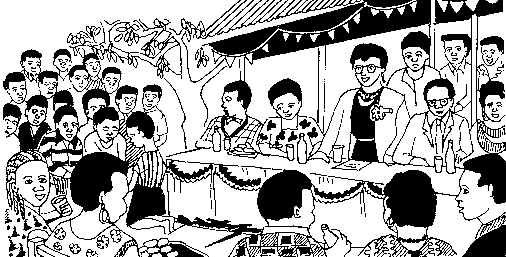Tweet
Translations:
'العربية / Al-ʿarabīyah
বাংলা / Baṅla
Català
中文 / Zhōngwén
Deutsch
English
Español
Filipino/Tagalog
Français
Ελληνικά / Elliniká
हिन्दी / Hindī
Italiano
Polszczyzna
Português
Română
Српски / Srpski
Tiếng Việt
Türkçe
Other Formats:
Other Pages:
Modules
Site Map
Key Words
Contact
Utility Documents
Useful Links
COMMUNITY INTERNAL RESOURCES
by Phil Bartle, PhD
Training Handout
When a community decides to use more of its own resources, it becomes more self reliant. What resources of its own can it identify and use?
Internal Resources Check List (Local Inputs)
The facilitator does not dictate to the community that all these must be provided by the community. Instead, the facilitator can mention some or all of these, and ask the community members to identify those which the community can provide:- Donations: cash, land, buildings, supplies and equipment, donated by individuals who want to support their community. (They should be acknowledged and thanked in public meetings);
- Commercial: gifts from firms and businesses that want to advertise their good will and support of the community. (They should be acknowledged and thanked in public meetings);
- Communal Labour: time and labour donated by community members, some unskilled (like clearing grass, laying bricks), some skilled (carpentry, masonry), meetings, planning, supervision;
- Agricultural: farmers may donate food for the project: (a) to communal workers who are working on the project, or (b) to the executive committee to sell to raise cash for the project;
- Food: people who donate the preparing of food and refreshments to the community members on communal working days;
- Contributions: for credit club and similar financial projects, contributions from all members;
- Governmental: partial funding from federal, district or local governmental sources;
- Ceded funds. Sources may include district development committee participation;
- Non Governmental Organizations (NGOs): local community based organizations, churches, outside NGOs working locally;
- Anonymous Donors: benefactors who remain unknown.
––»«––
Public Fund Raising Event:
 |